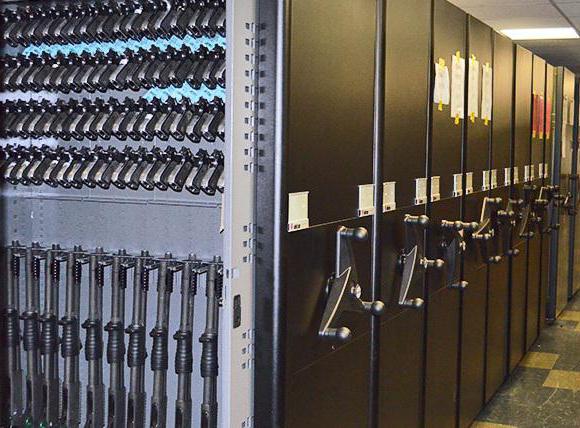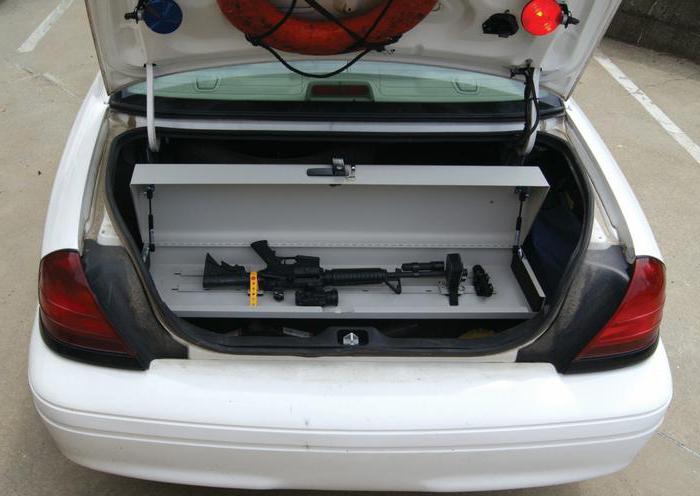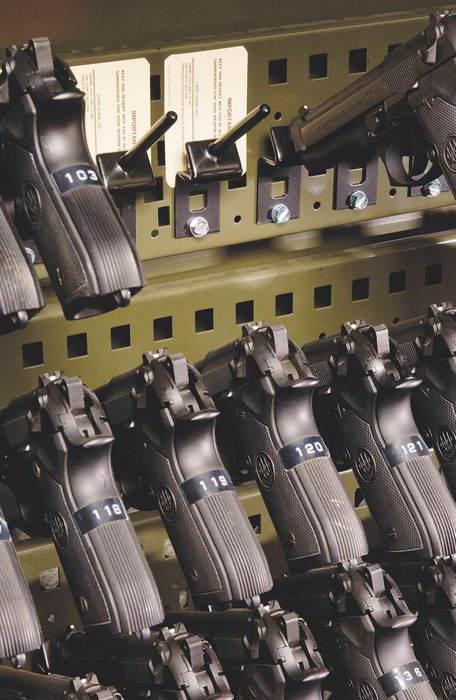Buying weapons is a pretty serious step. And the point here is not only that it is necessary to comply with established procedures and obtain permits. Particular attention should be paid to storage conditions and rules for carrying weapons. Let's consider them in more detail.
Relevance of the issue
Many, even experienced owners have many questions regarding the existing order. The fact is that, according to the Law on Arms (Federal Law No. 150), each region is entitled to provide additional norms to federal acts. In this regard, the requirements in various constituent entities of the Russian Federation may differ significantly. In addition, the specialists of the licensing department can put forward their own requirements. There are no clear formulations specifying the requirements relating directly to individuals in the legislation. Nevertheless, there is a general procedure that must be followed.
Normative base
The main requirements, in accordance with which the rules for carrying and storing hunting weapons are determined , are established in the Federal Law No. 150. The regulatory act contains provisions concerning other types of special equipment. The key requirement is in Art. 22. It says that service and civilian weapons should be stored in conditions that ensure their safety, security and preclude access by unauthorized persons.
Explanations
Many experts consider the above wording to be very vague. In this regard, experts recommend that before directly applying for a license to find out the rules for storing firearms in the territorial FRA. This need is related to the requirement of security. Storage rules for weapons and ammunition require the installation of a safe. However, this is not enough. It is necessary to ensure reliable protection of the metal box. Installing it in a separate room does not guarantee its safety. Real security can be achieved by a set of measures.
Government decree
This document specifies the general rules for the storage of weapons and ammunition owned by citizens. In Government Decision No. 814 of July 21, 1998, attention should be paid to Ch. 59. The following conditions are established in it. Weapons and cartridges that belong to citizens should be stored at the place of residence in compliance with the rules ensuring safety and security. Access by unauthorized persons should be excluded. The rules for storing weapons at home provide for a lockable safe or box of high-strength material. It is allowed to use a wooden cabinet studded with metal. ATS at the place of residence of citizens has the right to check the storage conditions of the acquired and registered weapons. The maintenance of special equipment in the places of stay should be carried out with the fulfillment of conditions that exclude access by outsiders to them. In accordance with these provisions, any fortified box or cabinet with a lock located at the place of residence of the owner of the weapon can act as a storage.

Instruction manual
It discloses in more detail the rules for storing ammunition weapons. The instruction was approved by Order of the Ministry of Internal Affairs dated April 12, 1999 No. 288. The rules for storing weapons established in it also require the installation of fortified structures that are locked. The box or safe should not be located at the place of registration, but at the address of the owner. Moreover, if a citizen has a collection of weapons, the room where it is stored should be equipped with a fire alarm. The entrance must be equipped with a metal door with additional locks and a box. Storage rules for hunting weapons and ammunition additionally establish requirements for windows. In rooms located on the first / last floor, grilles should be installed. If for technical reasons the room cannot be equipped with an alarm, the boxes / cabinets in which the weapon is located are attached to one of the walls with steel two or more bolts, the thread diameter of which is from 16 mm.
Requirements for legal entities
The rules for storing weapons in organizations provided for in paragraph 164 of the Instructions require that they be kept in drawers, pyramids, cabinets, which are installed in specially equipped rooms, in a discharged state, with the trigger pulled out of the fuse. Items must be oiled and clean. Storage is carried out separately from cartridges. On a box, a pyramid, a cabinet tags are attached. They indicate the type of model and number, in accordance with the inventory and the book of records. Such a requirement is established for weapons assigned to employees of a legal entity. Some organizations may provide for specific statutory tasks. In this case, the rules allow the storage of cartridges with weapons. They should be in clips, removable drums, magazines or shoes. Weapons in factory packaging (boxes, boxes) and cartridges in capping can be placed on racks. The placer may be kept exclusively in metal boxes. At the same time, they must be locked with two different locks.
Separate accommodation
Separate metal cabinets, safes, drawers, pyramids contain:
- Ammunition and weapons, except those specified in paragraph 164 of the Instructions. At the same time, elements containing pyrotechnic compositions charged with tear gas or other irritating substances should be in a separate package. A similar requirement applies to misfired cartridges.
- Artistic designs in which precious stones or metals are present.
- Weapons seized and taken for temporary storage from employees of organizations and individuals, as well as those on the balance sheet.
- Gunpowder, packaged in special metal sealed closures, as well as in plastic bags for sale at retail.
Storage rules for rifled weapons prescribe the installation of cabinets and drawers with locks, the walls of which should be at least 2 mm thick; in safes containing gunpowder, products including pyrotechnic charges or missile equipment - 3 mm; in containers used for carriage by air - not less than 1.6 mm.
Legislation gaps
The above weapons storage rules do not contain separate clauses relating to specific categories of owners. In particular, requirements are not established for legal entities that are detective agencies, sports, trade and other organizations. There are no specific requirements for athletes, hunters, collectors, amateurs, and so on. In accordance with the Instruction, the procedure provided for legal entities is applicable to citizens. Along with this, there are ambiguities in the requirements. For example, the rules for storing weapons include the installation of gratings on windows. At this point it is not clear whether they relate exclusively to collectors or to other citizens, too. Meanwhile, in rural areas, many individuals live in one-story houses. Accordingly, the requirement for gratings is somewhat absurd. Another incomprehensible point concerns the conditions for attaching the box to the wall, the presence of an additional compartment for storing gunpowder and cartridges. It is not clear whether this requirement applies to all owners or to specific categories. Experts recommend providing maximum security. This means that it is advisable to study all the rules for the storage of weapons - general and special, developed in FRA - and create conditions that are most appropriate for them.
conclusions
Based on the above information, the following storage rules for hunting weapons and ammunition can be formulated:
- The thickness of all the walls of the metal cabinet is at least 2 mm.
- The presence of 2 different castles.
- Installation of a separate metal box for ammunition, gunpowder. It should also have 2 locks, and its wall thickness should be at least 3 mm.
Storage rules for hunting weapons allow the installation of an additional lockable compartment in the cabinet. Its walls should also be at least 3 mm. You must understand that these requirements are the minimum necessary to ensure safety. Accordingly, if a citizen is the owner of a particularly valuable specimen of a gun, then a cabinet with walls of 2 mm cannot guarantee safety.
Expert Advice
Specialists advise with particular attention to choose locks for the cabinet. Locking mechanisms must be resistant to breaking and many years of frequent opening. Do not save and purchase mailboxes with mail locks. The resource of such mechanisms is very limited, and the reliability is minimal. Experts also recommend avoiding purchasing cabinets in which door locks are installed. As practice shows, Chinese mechanisms serve no more than a year, Italian and Israeli - 4-5 years. According to the results of the research, it was found that the owner of the weapon uses the cabinet for an average of 25 years, and opens it about 20 times a year. Thus, the need to install a quality lock is obvious. Most of the cabinets and safes for weapons are large in weight and height. To prevent the fall of such a structure, it is advisable to attach it to the floor or walls with bolts. This is true for a private home. Owners of suburban real estate should pay attention to the built-in designs of safes and cabinets. Such designs are highly resistant to cracking. In addition, they can be disguised quite easily. Do not forget about fire safety. Cartridges should be stored separately in a safe installed away from heating appliances. In specialized stores you can buy a fire cabinet.

Cost
The price of weapons cabinets is different. The cheapest are from 1 thousand p. But in the very first days of operation, the paint starts to peel off, and after a while the locking mechanisms will fail. In general, the reliability of such boxes is very doubtful. A quality cabinet can cost tens of thousands of dollars. The price of a box depends on its size. For example, pistol metal safes are smaller, respectively, their price is lower.
CAO
The rules of storage and carrying of weapons must be strictly observed. For non-compliance with requirements, liability is provided. For violation of firearms storage rules , administrative sanctions are imposed. Officials are threatened with disqualification for a period of six months to a year, organizations - suspension of activity for 10-60 days. Fines are also provided. For officials, the penalty amounts to 4-5 thousand rubles, organizations - 40-50 thousand rubles. Non-compliance with the procedure for issuing certificates on training, testing knowledge of safety requirements when handling weapons or medical reports on the absence of contraindications from citizens to possession of weapons shall be punishable by an administrative fine. For officials, it is 10-50 TR Perpetrators can also be disqualified for 0.5-1 years. If the indicated actions were committed by an entity held administratively liable for a year for violation of the rules for storing weapons , their production, sale or accounting, they shall be sanctioned. It is 20-50 thousand p. In addition, the guilty party will confiscate weapons. Failure to comply with the procedure for maintenance or transportation by citizens who have permission from the ATS entails a warning or a fine. The amount of recovery - 500 rubles.-2 thousand rubles. Legislation is also allowed to carry out forfeit weapons.

Additionally
When installing a weapon on the weapon that ensures silent shooting, or a night vision sight (except for hunting devices), a fine of 2-2.5 thousand rubles is imputed to the perpetrators. In this case, the equipment used is subject to confiscation. The procedure for using devices that ensure silent shooting, as well as night vision sights, is established by the Government. Illegal manufacture, transfer or sale of pneumatic weapons with a caliber of 4.5 mm, muzzle energy of which is greater than 7.5 J, imposes an administrative penalty of 1.5 to 2.5 thousand rubles - for citizens, 3-4 thousand rubles. - for officials, 30-40 thousand rubles. - for legal entities. In this case, confiscation of the product is allowed.
Tighter Order
The Ministry of Internal Affairs proposes to complicate the rules of storage and transportation of weapons for individuals. So, it is supposed to introduce a change in the order, consisting in the following. Storage of weapons is allowed by persons only at their place of permanent residence (at the registration address). An entity temporarily located, for example, with relatives or in a rented apartment, cannot contain the corresponding products. Another innovation relates to transportation. The rules prescribe the transport of weapons only with the permission of the police.
Important point
According to article 22 of the Federal Law No. 150, storage of weapons, as well as cartridges for them, is allowed by entities that have received special permission to purchase them. It is issued by ATS. Weapons purchased without a license and not registered with law enforcement agencies are stored without permission. At the same time, conditions must be created to ensure security and prevent unauthorized access by outsiders.
Criminal penalty
In Art. 222 of the Criminal Code establishes liability for non-compliance with the storage order of cold, gas and throwing weapons. Punishment is provided from restriction of liberty to 3 l. to imprisonment up to 8 liters. In Art. 222 of the Criminal Code defines sanctions for the illegal sale of products. Criminal liability (from 180 hours of compulsory labor to imprisonment for 2 years with or without money recovery) is also established in the case of illegal (in the absence of a license) manufacture or repair of weapons completing them, as well as production of ammunition, explosives and explosives . Punishment is also imputed in the case of manufacturing products by a handicraft method. In this case, an examination is carried out.
Negligence
As you know, there are various types of weapons. For most of them, obtaining permits is required . Storage rules for traumatic weapons require, as in other cases, to ensure safety conditions. Negligence is equated with a criminal offense. The criminalization of non-compliance with the established procedure is caused by its high danger. The object of the crime is health and life, and in some cases the property of a person. Not observing the storage rules for smooth-bore weapons or any other type of weapon , the subject creates the conditions for use by unauthorized persons. This can lead to serious consequences.
Failure to comply with the terms of registration and registration of products
Violation of the established procedure by a citizen involves a warning or an administrative fine of 300-1000 r. The subject is obliged to register / register the weapons acquired under license in the prescribed time, to extend the validity of documents. In the event of a change in the address of permanent residence, a citizen must re-register the product within the prescribed period.
Transportation prohibitions and restrictions on use
The Code of Administrative Offenses provides for liability for shipping, violation of the procedure for the transportation or use of weapons and ammunition. Sending products involves a fine of 1-1.5 thousand rubles. If you violate the rules of transportation, the perpetrator faces a penalty in the same amount. If the procedure for using products is not observed, a fine of 1.5-2 thousand rubles is provided. with or without exemption. Responsibility for the use of weapons in violation of applicable regulations has also been established. So, in the case of firing in places not designated for this, the perpetrators face an administrative fine of up to 1 thousand rubles. In this case, the product may be seized from the subject.
Conclusion
Despite some vagueness of a number of provisions, one thing is clear. Weapons - a dangerous item that creates a threat to others. In order to avoid negative consequences, it is necessary to ensure proper conditions for the contents of such products. In case of failure to comply with the requirements of legislative and other regulatory acts, those responsible may be held administratively and criminally liable.